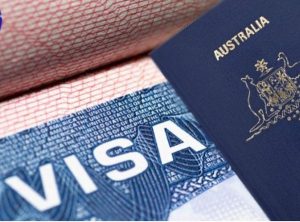Federal government vows to fix visa backlog
The federal government has vowed to reduce Australia’s visa backlog to make sure the nation remains competitive in the global skills market.
And immigration minister Andrew Giles says the government had already made progress in tackling what he called “massive” problem.
In a recent speech at the Migration Institute of Australia National Conference, Mr Giles revealed the visa backlog now sits at around 880,000 applications.
The figure is down from almost a million non-humanitarian applications that were outstanding before the May federal election.
Mr Giles also indicated that the minimum salary to qualify for a skilled worker visa could soon change.
The government first flagged the visa issue in July, saying it was determined to reduce the backlog as part of a strategy to tackle Australia’s skills crisis.
Also in July, the Department of Home Affairs said it had redirected extra resources and was bringing on more staff to address the problem.
 At the Jobs and Skills Summit in September the government announced it would spend more than $30 million to hire 500 extra staff.
At the Jobs and Skills Summit in September the government announced it would spend more than $30 million to hire 500 extra staff.
Mr Giles said in his speech that there is now an extra 260 staff working on visa applications and a further 260 are being trained.
He said that since June 1, the department had processed more than two million temporary and permanent skilled visa applications, including 1.35 million visas for visitors, students, and temporary skilled workers.
Mr Giles said “policy changes” would “streamline” the processing of temporary visas, leaving fewer in the backlog.
Since the beginning of June, about 2.2 million new visa applications have been received – an increase of 495,000 compared with last year, during the COVID-19 pandemic when international borders were closed, according to media reports.
Mr Giles said the backlog created “ongoing uncertainty” for applicants, which was not only difficult for them, but also for businesses.
He said it was not “smart for hundreds of thousands of people” to be on bridging visas, which can be issued when an individual’s substantive visa expires and they are waiting for a new application to be processed.
“Australia does not have the luxury of operating in an environment free from competition,” Mr Giles told the conference.
He said the federal government planned to improve pathways to permanent residency after it increased the permanent migration cap from 160,000 to 195,000 visa places for the current financial year.
“Leading technology businesses, medical research institutions, and major infrastructure companies are faced with the impossible situation of trying to recruit across the world and unable to offer the sponsored pathway to permanent residency, that is required to compete internationally,” Mr Giles said.
“This Government understands the benefits of permanent residency and the dangers of keeping people trapped on temporary visas,” he said.
Labor has previously pledged to increase the Temporary Skilled Migration Income Threshold (TSMIT).
The TSMIT is the minimum salary that must be offered when sponsoring a temporary skilled migrant and is currently set at $53,900 — a figure that has been frozen for almost a decade.
Mr Giles said over 80 per cent of full-time jobs have salaries higher than this figure.
Average pre-tax earnings for full-time adult workers in Australia are $1,769.80 a week, or $92,029.60 a year, according to the Australian Bureau of Statistics.
“This wage is not indicative of the place for skilled migration in the modern labour market. It is too low and this government will increase it,” Mr Giles said.












